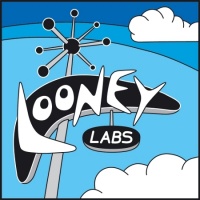 Rolling for Initiative is a weekly column by Scott Thorne, PhD, owner of Castle Perilous Games & Books in Carbondale, Illinois and instructor in marketing at Southeast Missouri State University. This week, Thorne looks at the new Looney Labs distribution set-up.
Rolling for Initiative is a weekly column by Scott Thorne, PhD, owner of Castle Perilous Games & Books in Carbondale, Illinois and instructor in marketing at Southeast Missouri State University. This week, Thorne looks at the new Looney Labs distribution set-up.Planned on writing about what I hoped and expected to see in 2012, when the announcement that Looney Labs, maker of Fluxx, Seven Dragons, Ice Dice and other well regarded small games, had signed an agreement with ACD Distribution, Diamond Comic Distributors and Alliance Games Distribution to exclusively distribute Looney Labs products in the US and Lion Rampant Distribution as the company's Canadian distributor hit my email box. From the press release:
In the U.S. hobby game market, Looney Labs game titles will be available through ACD Distribution and Alliance/Diamond Game Distributors. In Canada, Lion Rampant will become Looney Labs' primary distributor, while Publisher Services, Inc. (PSI) will continue to supply Looney Labs games to international markets as well as the U.S. mass market and book trade.
What does this mean? For Looney Labs, as the company says further in the press release, it allows the company to more efficiently allocate resources. Instead of spending time and money shipping out product to multiple distributors, it only has to ship to four. Those shipments will likely be larger, resulting in further economies of scale for the company. Also, it appears that Alliance, at least, will set up a subscription service for retailers to automatically receive Looney Labs promotional and demo material
For Alliance, ACD, Lion Rampant, Diamond and PSI, more sales will come their direction as those distributors cut off by Looney Labs can't supply accounts with new releases or restock their currently product lines. Their customers who want to offer Looney Labs' product will, by necessity, have to purchase them from one of the four sources, or drop the line.
For retailers who don't use one of the aforementioned four distributors and who wish to keep carrying Looney Labs' products, it means opening up another account or expanded dealings with yet another distributor, with the accompanying potential loss of discount, increased shipping time and/or freight charges, since it is likely that one or more of these reasons precluded them from already using one of the "Big Two." Unlike HeroClix, whose manufacturer negotiated a similar arrangement with Alliance and Diamond, Looney Labs' products appeal to a much wider market segment and retailers will likely feel the need to make the effort to keep Fluxx et. al. on the shelves. For retailers who already deal extensively with one of the four, no change, save for the new subscription service for promotional products.
For consumers, probably no change. A properly operating channel of distribution means no disruption in getting products to the customer. If their retailers currently deal with one of Looney Labs' partner distributors, product should keep flowing and, if anything, the retailer should maintain an even better in-stock of Looney Labs products and get more of Looney Labs' promotional cards to them as well as increasing the availability of the entire product line in the store.
The only ones that get hurt by this, at least in the short run, are the small distributors not part of the agreement and the retailers who didn't already deal extensively with Alliance, ACD, Diamond or Lion Rampant. In a still recovering economy, the distributors lose a steady selling product line and the accompanying cash flow, while the retailers lost the benefits they saw from purchasing Fluxx from another source. Never a good thing to have happen.
The opinions expressed in this column are solely those of the writer, and do not necessarily reflect the views of the editorial staff of ICv2.com.


